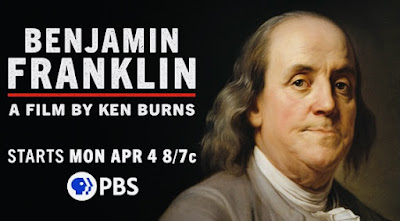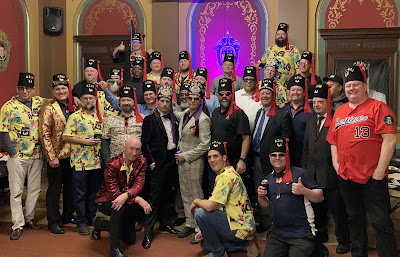And, speaking of film (see post below), if you happen to find yourself in Paris next Friday, maybe enjoy a screening of a Masonic-themed animated film during a conference organized by Jean-Luc Leguay. (If the name sounds familiar, Leguay paid a few visits to Masonic Hall six years ago, lecturing at the Livingston Library and in l’Union Francaise Lodge 17.) From the publicity:
Thursday, March 31, 2022
‘The Art of Enlightenment’
And, speaking of film (see post below), if you happen to find yourself in Paris next Friday, maybe enjoy a screening of a Masonic-themed animated film during a conference organized by Jean-Luc Leguay. (If the name sounds familiar, Leguay paid a few visits to Masonic Hall six years ago, lecturing at the Livingston Library and in l’Union Francaise Lodge 17.) From the publicity:
The Art
of Enlightenment:
An Initiative Path
to the Sacred
Friday, April 8 at 8 p.m.
Paris
Open to the public (€10)
RSVP here
Respectable Lodge Sons of Noah 1615, under the National Grand Lodge of France, invites you to the ultimate screening of Jean-Luc Leguay’s animated film Consecration de Loge and attend the conference given by the master.
Labels:
Art of Enlightenment,
films,
GLNF,
Jean-Luc Leguay
Monday, March 28, 2022
‘Ben Franklin gets the Burns treatment’
Benjamin Franklin, revered Freemason, Founding Father, inventor, natural philosopher, statesman, entrepreneur, and more, is the subject of a two-part biography by filmmaker Ken Burns. It can be seen starting next Monday on PBS television and streaming.
I am doubtful the film will say anything about Franklin’s Masonic association. He was a busy man who milked the utmost from his eighty-four years in this world, whereas Burns’ story runs four hours.
Ken Burns, in his forty-one years of producing documentaries, has touched the periphery of Masonic history many times. Some of his previous biographies (Lewis & Clark, Mark Twain, The Roosevelts) honed in on famous Masons, and many of his histories bump into the works of others (The Statue of Liberty, The National Parks). Then, of course, his epic anthropological films (Jazz, Baseball, Country Music) unavoidably discuss the lives and deeds of a number of Masons.
It was on that basis that I once emailed him about twenty years ago to pitch the idea of a film on Freemasonry. Granted, it’s a huge subject, but it encompasses story elements that figure into his documentaries. From the giants of history astride the globe, to folks you might know living their lives on Main Street—with race relations and women’s inclusion in the mix—human progress is encapsulated in the Masonic story. There is a bottomless inventory of archives and artifacts, material culture and ephemera, art and music to drive Burns’ use of photographs and movie reels that supplement his interviews, narration, and cinematography.
I never did hear back.
Sunday, March 27, 2022
‘Bob Cooper on early catechisms’
 |
| Robert L.D. Cooper |
Cooper, I think we can say, is the dean of Scottish Masonic historians. He is a Past Master of Lodge Sir Robert Moray 1641, and also of Quatuor Coronati 2076, the premier lodges of Masonic research in Scotland and England, respectively. He is an author of very useful and accessible books for Masonic readers, including The Masonic Magician, about Cagliostro; The Red Triangle, a chronicle of anti-Masonry; and Cracking the Freemason’s Code, among the best primers on the fraternity to emerge during the first decade of this century. You could dive safely into any of his books, and I recommend The Rosslyn Hoax? to anyone stuck on the Templar nonsense.
His topic at Eclipse Lodge was intriguing: “Early Freemasonry 1598…or Freemasonry Before 1717.” I think that period is without form and void in the minds of most Freemasons in the United States. Despite the centrality of Scotland to Freemasonry’s embryonic years, we Americans mostly see the Craft as having been born in early eighteenth century London, but the scant evidence are tantalizing pieces of the same vexing puzzle. Bob’s overall point was to walk us through the catechism of the Edinburgh Register House Manuscript, which he terms the oldest Masonic ritual, dated 1696. To get there, he had to present historical context first, so he tied together for us the Art of Memory, Hermeticism, William Schaw, and the need for an illustrative catechetical ritual to teach illiterate stone masons the secret education that goes well past mere modes of mutual recognition.
Needless to say, he did so convincingly and in only about an hour. Click here to read this seventeenth century catechism. You’ll see many things that are foreign to your lodge experience, but it’s amazing how much is fitting or at least familiar enough.
For more on the Art of Memory, see the Frances Yates book.
Saturday, March 26, 2022
‘Gentlemen of the White Apron’
My close personal friend Michael Halleran, former executive editor of The Journal of the Masonic Society, will make a long awaited return to New Jersey this summer to present a talk on Freemasonry in the U.S. Civil War. This will be hosted under the auspices of the education committee of the grand lodge there on Saturday, July 30 in the “Fellowship Center.”
Of course Halleran is the Past Grand Master of the Grand Lodge of Kansas who authored The Better Angels of Our Nature, the myth-busting history of Freemasons’ actions in the Civil War.
Sunday, March 20, 2022
‘The ALR next week’
The American Lodge of Research will meet again next Tuesday at Masonic Hall. That’s March 29 at 7 p.m. in the Colonial Room on the tenth floor.
Two presentations are scheduled: Worshipful Master Conor will discuss Alexander Hamilton, who was not a Freemason, but had certain connections to the Order. A related historical document, rare and precious, will be on loan to us for this evening. Come check it out.
The next paper will be presented by New Jersey’s Bro. Ron Murad, who will speculate into the ritual significance of Ethiopia.
We ask all planning to attend to make a reservation here, and remember photo ID is required to enter the building.
In lieu of a lodge collation, the brethren will adjourn to a landmark Ukrainian eatery in the East Village for dinner after the meeting.
‘Washington inauguration re-enactment’
George Washington will be inaugurated again—and, really, what would you give to have him back in the presidency right now?—next month in the post-COVID return of the annual ceremony re-enactment. This will take place in Masonic Hall on Saturday, April 30, which is the anniversary of the 1789 inauguration of the first president.
Maybe the team will be back at Federal Hall next year, but this time it’ll be in the Colonial Room on ten at noon.
Photo ID is required to enter the building.
Saturday, March 19, 2022
‘National Grotto Day 2022’
Another National Grotto Day is done, and Azim in New York City is ten Prophets richer, having put that many through the ceremonial at Masonic Hall this afternoon.
It was a subdued effort, with several dozen in attendance egging on the Pilgrim Neophytes through a short form ritual, but the story of Sympathy and Good Fellowship shone through. And the booze began flowing just before noon, so we had that going for us.
Our Prepared Candidate, the exemplar who made the ritual journeys on behalf of the group, was none other than Alex, a New Jersey Mason who works professionally as an actor—and what a fortuitous choice that was! I guess he does a lot of improv work, because he was uncannily brilliant.
Note to self: Buy a costume befitting a religious leader. (I’m Chaplain for the ritual, and today I was surprised to become Chaplain for Azim’s meeting as well, so I better step up my wardrobe game.)
Tuesday, March 1, 2022
‘Sankey Lecture next month’
Ontario Freemasonry has the kind of relationship with Brock University that I wish grand lodges in the United States would cultivate with academia. (Like this.) Since 2009, the brethren there have the Sankey Centre for Masonic Studies at Brock.
The center drives research into Freemasonry’s importance in Canadian society and in the world. Specifically, its purposes include hosting Masonic scholars for lectures. Charles Sankey was a leader in Masonic education during the last century. His personal Masonic book collection and papers are found in one of Brock’s libraries. The inaugural Charles A. Sankey Lecture was hosted in 2010 (check out 2012’s), and the next one will take place April 10.
Subscribe to:
Comments (Atom)









































































